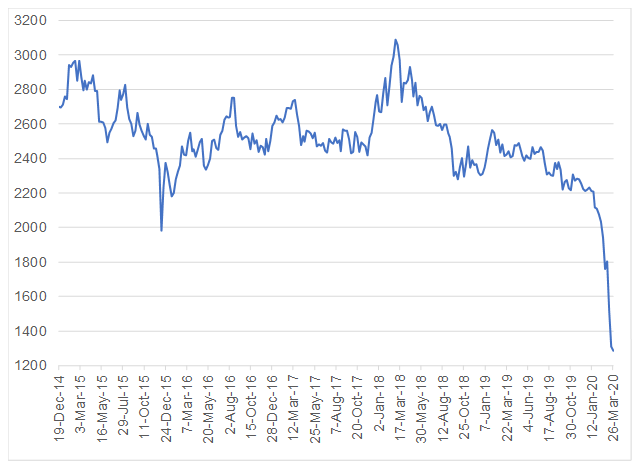Many conservative South African ([SA] and global) investors in recent years squirrelled away their savings in property shares to earn an attractive, growing income. Unfortunately, this bubble burst over the last few months and even the highest quality property companies have seen their value decimated. Selected YTD (to 25 March) declines among local property counters include Growthpoint (-45%), Redefine (-74%), Resilient (-46%), Nepi Rockcastle (-40%), Vukile (-63%), Attacq (-58%) and Hyprop (-60%). These share price drops follow the already steep falls across the board in 2019 and the abovementioned shares are currently trading at 40%-80% discounts to their respective book net asset values (NAVs).
So, what happened and is the loss in value permanent? We conclude that in a base-case scenario, these values are well below current book values, but higher than the share prices. In the quality counters, the companies are fundamentally worth 50%-100% more than their share prices (unless Armageddon prevails!). But there is a high risk of shareholders not getting dividends for one, or even two, years.
The dire local economic outlook had already hit share prices hard when the novel coronavirus (COVID-19) hit and the sector is now in crisis. These are unprecedented times and the world has changed in the last few weeks. Some tenants (especially in the retail sector) will soon earn little or no turnover for some time, and we have no doubt they will want to renegotiate rentals with landlords. Some smaller tenants will go bankrupt.
A typical current scenario, even for a high-quality property company, is as follows:
- Panic in the boardroom.
- Gearing of 30%-45% with a realisable property value of 20%-40% below book values. In many cases, debt covenants are certain to be broken.
- There is no chance of material short-term property sales to address loan to value (LTV) equations.
- Future rentals are uncertain (despite rental contracts) and sustainable rentals are, in many cases, 10%-30% below current levels. Apart from essential services providers (pharmacies, food retailers etc.) malls are basically being closed this week.
- Property company management teams are, however, doing scenario planning to assess the worst case and sustainability.
It is clear to us that the property sector will be reset after panic around the virus has subsided. The good news is that these big property companies generally have excellent management teams to navigate this change. The fate of the companies is largely dependent on SA banks, who have very strong balance sheets and who we believe will be very co-operative in working with these companies to navigate the way through the current crisis. Focus will turn from LTV ratios to interest cover, cash flow and sustainability. It is not in the interests of the banks to “pull the plug” on some of their biggest clients, and if they did, the income statement impact for banks would be damaging. They have a vested interest. We expect these property companies to work their way through this scenario together with the banks, with “reset” value emerging.
Property management companies have no idea where rentals will settle, and they will largely depend on the health of the economy and their tenants. About 30% of retail turnover is from “safe” companies such as food retailers, cellphone companies and banks. Many office tenants will remain robust and industrial/logistics rentals will depend on tenant quality. So, it is not a disaster across the board, but months of hard negotiations will follow. Property management teams have expressed a realistic approach to rental negotiations, and we are comfortable that a reasonable middle ground will be found between landlords, tenants and banks. Ironically, the nature of the current crisis is likely to result in a spirit of compromise.
Nevertheless, LTV is a big issue. Picture a typical property company with R100 of book value and R40 of debt – that 40% LTV ratio is usually comfortable. If the book value is written down by 25%, the LTV ratio goes up to a delicate 53%. Ironically, interest cover is probably still palatable in this scenario, but the equation needs to be addressed. We do not expect banks to become obsessed with LTV ratios in the current setting, but they will want property companies to have a plan to reduce this. Asset sales are usually a partial solution, but this looks increasingly unachievable. Withholding dividends payments becomes the next, and most likely, scenario. If a company can generate an 8% yield on book value, ploughing this back into debt repayments (as opposed to dividends), with a two-year dividend holiday, can reduce the LTV ratio from 53% to 37% – back into the comfort zone. Not all listed property companies will be forced into this situation. Redefine and Hyprop have already delayed their interim dividend payments. On Wednesday’s (25 March) conference call, Vukile made no commitment concerning the payment of the next dividend.
A big issue with withholding dividends is taxation. Real estate investment trust (REIT) legislation allows companies designated as such, to not pay taxation and distribute income to shareholders who receive the distribution as taxable income. If REITs do not distribute 75% of their income, then the current rules say they must pay tax on their income. We believe the property sector is in the process of negotiating with Treasury in an attempt to waive this rule – at least for a once-off time period.
So where does that leave valuations and prospects for share price recovery? We are in the eye of the storm and there is plenty of uncertainty ahead. But, ultimately, these big property companies have quality assets and as a default we expect them to work with banks and landlords to get through the current crisis. As a generalisation, fair gross property values are probably 20%-25% below book values. After taking debt into account, net fair share values are probably 30%-40% below published book values, but share prices reflect far worse scenarios than this. As an example, Growthpoint is trading at a 51% discount to book value and Vukile at a 64% discount. Unless the lockdown prevails for an extended period, we believe share prices in general are offering good value.
We acknowledge the risk of being overly negative in our assessment, which is no doubt influenced by the fact that we are about to start a 21-day lockdown. Many of the companies will argue that they are in a better scenario than the one we sketched above and those with low LTV ratios have more of an ability to see through the current scenario without equity value being damaged as much. We have specifically not gone into individual company detail in this note as the intention is to describe the overall market scenario. Further company specific recommendations will follow. In addition, interest rates have declined (and could decline further), which is usually a big positive driver for property company fundamentals and share prices.
We conclude that share prices are factoring in a far worse scenario than our base case. However, we believe that investors should stick with quality companies with a focus on the balance sheet and factor in a full or partial decrease in distributions for a time period. We sense a positive attitude from all the role players in working through the crisis. But there is a long road ahead. For shareholders who have taken pain already we would recommend seeing it through.
In Figure 1 below, we highlight the share price of what is considered the highest quality counter on the SA market – Growthpoint, which is trading at an historic dividend yield of close to 15%.
Figure 1: Growthpoint share price performance, December 2014 to date (ZAc)

Source: Anchor, Bloomberg


